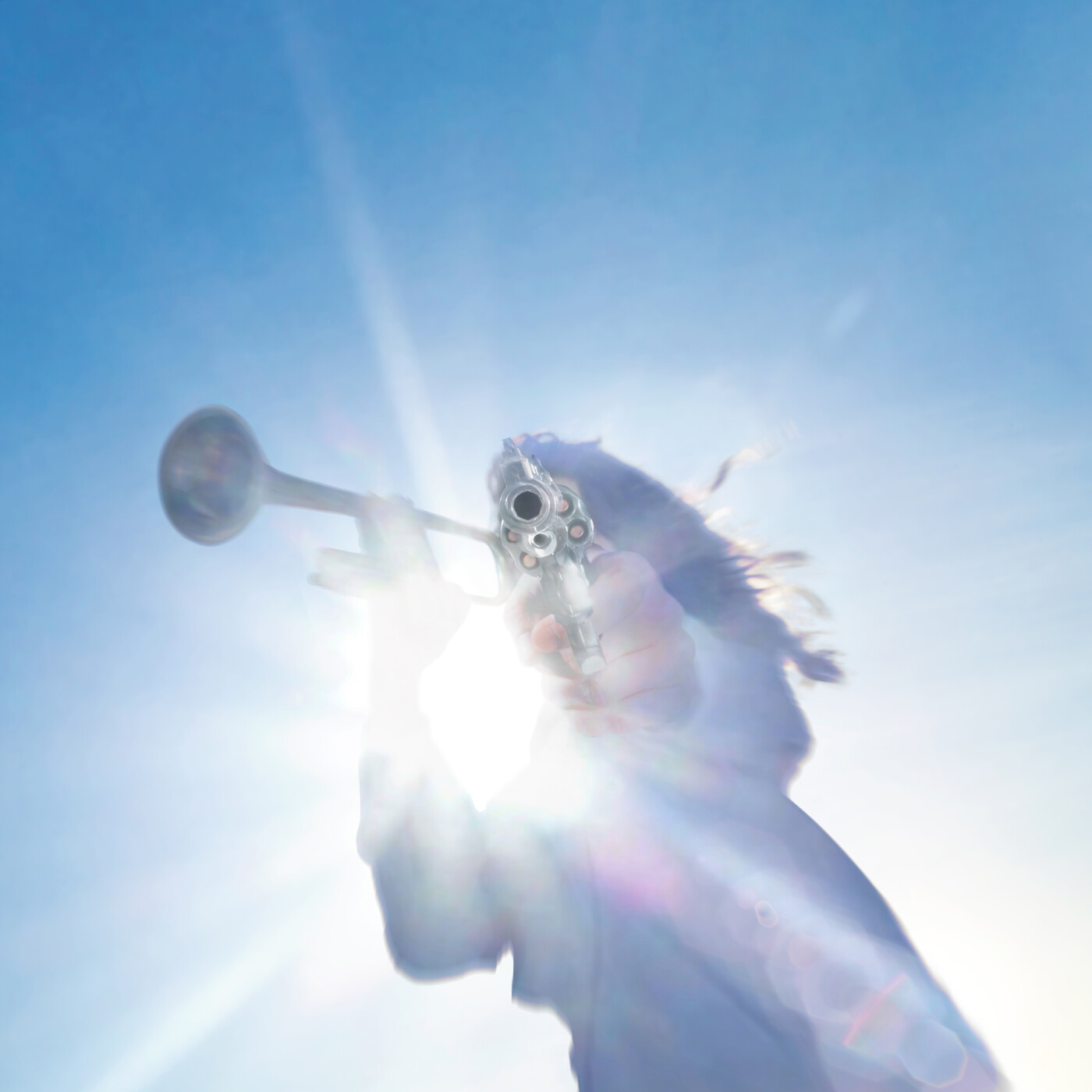The quick follow-up LP is always a sketchy proposition. It happens all the time: An artist puts a lot of effort into a statement album, piling up more songs than they can use. Upon completion, their creative juices are flowing, so they decide to keep going. A second batch of songs arrives quickly, assembled from the first project's surplus (or at least built on that foundation). The results are often enjoyable, but they rarely surpass the previous effort. Think of Sufjan Stevens piling his Illinois overflow into The Avalanche, Beach House losing some of Depression Cherry's sparkle on Thank Your Lucky Stars, Jeff Tweedy quite clearly presenting Warm's microwaved leftovers on Warmer. Radiohead's Amnesiac is a remarkable work of art, but anyone who tells you it's better than Kid A is laughably, catastrophically full of shit. So when Bill Callahan announced Gold Record, I was suspicious.
The singer-songwriter formerly known as Smog returned from a six-year absence with last year's Shepherd In A Sheepskin Vest, a generous 20-song set that found him settled down in Texas with a wife and child, sounding older but somehow less weary at age 53. No longer a tortured soul riding for the feeling, Callahan was peacefully anchored at home, allowing himself to love and be loved, reflecting on domestic life via serene poetry tempered by blunt comedy. It was as if "Dress Sexy At My Funeral" had morphed from a smirking fantasy into a contently sighing reality. Backed by minimal, organic instrumentation that glowed like twilight, Callahan's old fixations on sex, death, and nature remained, softened and sobered but still occasionally surreal. On "Confederate Jasmine," he imagined howling wolves threatening his son's life by day and awakening his wife for bloody intercourse by night.
Callahan had clearly crafted Shepherd with care, and the album's lengthy tracklist suggested he had not held back. Thus, when he announced this past June that he'd be releasing 10 more new songs under the title Gold Record, it was natural to wonder if we'd be getting Sheepskin scraps. To be clear, Bill Callahan's scraps are nothing to turn your nose up at; anyone who has spent time under the spell of Knock Knock or A River Ain't Too Much To Love or Apocalypse knows you don't turn down new music from this guy, especially not after going the better part of a decade without any. This new music just probably wouldn't be as noteworthy as the music that preceded it.
Incredibly, though, not only is Gold Record its own album with its own distinct vibe, it may even be better than Shepherd In A Sheepskin Vest. Certainly there is connective tissue between the two records -- a shared sense of place and perspective, a continued preference for easygoing acoustic arrangements that do more with less. His songs still casually amble into their epiphanies, as if implicitly posing the question, "What's the rush?" The danger and unpredictability that coursed through his older records is once again replaced by straight-faced admissions like, "The babies make me feel at ease/ With eyes like honey-drunk bees." But the dreamy, impressionistic haze that was draped all over the last album often evaporates here, and Callahan has broadened beyond a singleminded focus on his family to make room for short stories, character studies, and even something like music criticism. "It feels good to be writing again," he famously sang in one of Shepherd's most meta moments, acknowledging that he was getting back into his zone after a long stretch of inactivity. It turns out he was just getting started.
You probably know this by now. Despite that headline up top, there is nothing premature about this evaluation. Reasoning that Gold Record is his version of a stack of hit singles, Callahan has been rolling out the album all summer, one song per week, leading up to its release this Friday. Nine of the 10 tracks are already out, leaving only closer "As I Wander" to be revealed. By releasing Shepherd in chunks and allowing its runtime to stretch out past an hour, Callahan invited you to get lost in his reverie. By contrast, Gold Record's weekly drops have given each track its spotlight moment, a chance for listeners to zero in on each song and soak up the details that elevate Callahan beyond so many would-be wizened sages: the piercing wisdom that changes your perception of the world, the vulnerable confessions that bombard your heart from surprise angles, the idiosyncratic phrasing and inspired asides. If you've been following along, you're well aware of what a hot streak he's on.
Gold Record finds Callahan at the peak of his powers, showing off how many different kinds of great songs he can funnel his personality into. They are tied together by his current tendency to let his deep, authoritative voice lie low within a quiet arrangement, beckoning you to come over and grab a seat. A passive listener might not notice much difference between the whistling Western pastiche "Cowboy" and the musician's travelogue "As I Wander," on which Callahan imagines himself as a train conductor guiding his audience safely home. The same conversational baritone guides us through the somber self-reflection "35" ("I can't see myself in the books I read these days/ Used to be I saw myself on every single page") and the goofball ditty "Ry Cooder" ("English rockers, all their money goes straight up their nose/ But Ry just smiles and tries a difficult yoga pose"). Yet the range Callahan has carved out within this context is staggering.
On one hand there are riotous larks like "Protest Song," on which Callahan recalls watching some young troubadour's embarrassing attempt at a political anthem on late-night TV. The only thing funnier than his aghast cries of "Oh my god!" is the cartoonish reading he brings to the line, "Step aside, son, you're gonna get hoyt." That song flows directly into "The Mackenzies," a mesmerizing narrative in which Callahan's protagonist -- "the type of guy who sees a neighbor outside and stays inside and hides" -- allows the older couple next-door to welcome him inside and shower him with hospitality. He agrees to stay for dinner; they bond over a mutual appreciation for Mel Tormé and "the early movies of Kid and Play." Near the end, things take a deeply moving turn that also ramps up the haunted uncertainty at the song's blurry edges. It's like a Hallmark movie that vaguely threatens to become Lynchian without losing its essential warmth.
At times on Gold Record, Callahan continues to render married life in all its intimate splendor, though there's always some doubt as to whether he's chronicling his own experience or inhabiting a character. On the bucolic gallop "Another Song," he takes the afternoon off work to lay with his wife and bask in the beauty of the sunset: "And the light that's leaving takes its own sweet time/ Changing colors slowly like fruit on the vine/ And tonight, Lord, tonight, some of it's mine." In contrast to that deeply romantic portrait, "Breakfast" explores the little negotiations necessary to make such a union last: "I drink so that we don't fight/ She don't drink so that we don't fight." His old Smog classic "Let's Move To The Country" gets an unvarnished remake with its tentative elliptical sentences filled in; Callahan caps off the suggestion, "Let's start a family/ Let's have a baby/ Or maybe two," with a gentle wordless coo that runs directly counter to the original track's nervous tension.
His philosophizing about marriage takes another form on the opening waltz "Pigeons," in which he portrays a limo driver offering unsolicited advice to his newlywed passengers. "When two atoms from the Big Bang/ Get back together with the old gang," Callahan croons, "I drop them at a fancy dancy boutique hotel/ And I drive off alone, but I'm not alone." The song's golden-hour profundity is enhanced by subtle musicianship and mirage-like production that calls back to Bob Dylan's recent Rough And Rowdy Ways -- and like Dylan, Callahan undercuts his own sentimentality with baldly hilarious imagery like pigeons gobbling up wedding rice and exploding somewhere over San Antonio. In terms of Dylan's career arc, though, Callahan is somewhere closer to Time Out Of Mind, the Grammy-winning 1997 release that kicked off Dylan's latter-day renaissance.
Shepherd seemed to similarly mark out a new era for Callahan, positioning him as an elder statesman perched on his porch, beginning what could be a richly rewarding journey into old age. He telegraphs those intentions on "Pigeons," which begins, "Hello, I'm Johnny Cash," and ends, "Sincerely, L. Cohen" -- two fellow baritone geniuses, legends whose late-career offerings seemed to amplify their mystique by emphasizing their fragile humanity. As far as I know, Callahan is not on death's door, so we'll hopefully have to wait decades for his equivalent of "Hurt" or You Want It Darker. In the meantime we can confidently suspect that there's a lot more gold where this came from.
Gold Record is out 9/4 on Drag City. Pre-order it here.






